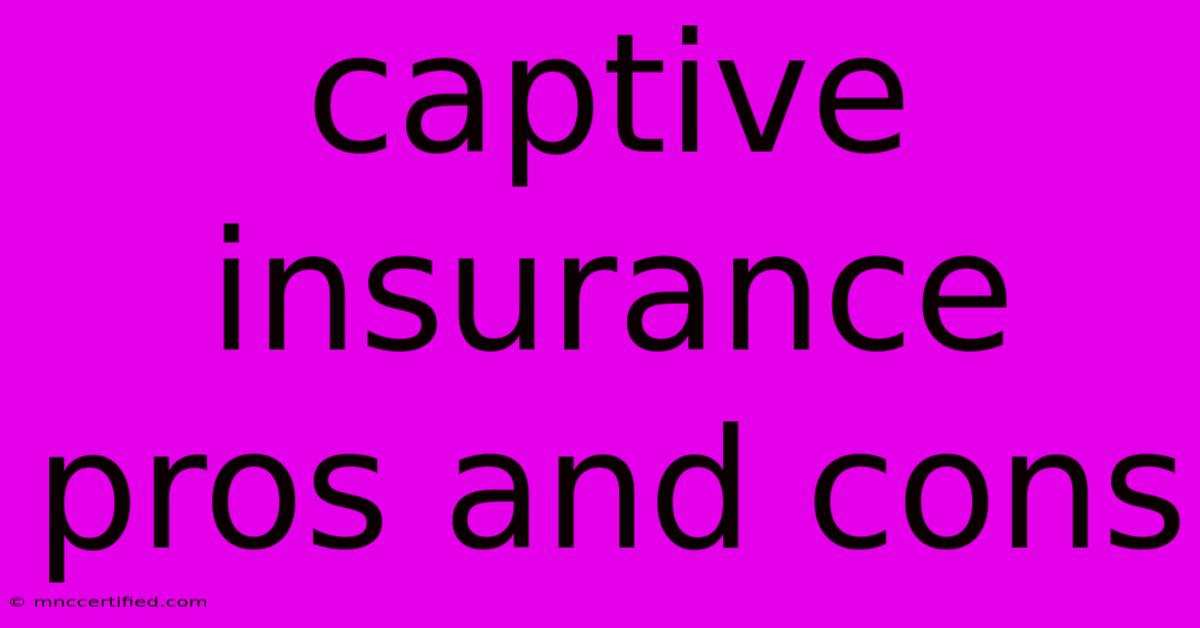Captive Insurance Pros And Cons

Table of Contents
Captive Insurance: Weighing the Pros and Cons for Your Business
Captive insurance companies are increasingly becoming a popular risk management tool for businesses of all sizes. But are they right for your organization? Understanding the pros and cons of captive insurance is crucial before making a decision that could significantly impact your financial future. This comprehensive guide will help you navigate the complexities and determine if a captive insurance program is the best fit for your risk management strategy.
What is Captive Insurance?
A captive insurance company is a wholly-owned subsidiary specifically created by a parent company (or a group of related companies) to insure its own risks. Instead of relying on commercial insurers, the parent company transfers its insurable risks to its captive insurer. This allows for greater control over risk management and potential cost savings. There are several types of captives, including single-parent captives, group captives, and protected cell companies (PCCs), each with its own structure and regulatory considerations.
Pros of Captive Insurance: Unlocking Potential Cost Savings and Control
The appeal of captive insurance lies primarily in its potential benefits:
1. Cost Savings: Long-Term Financial Advantage
One of the most significant advantages is the potential for long-term cost savings. By self-insuring, businesses can avoid the often high premiums charged by commercial insurers, especially for unusual or high-risk exposures. Over time, consistent underwriting profits can even generate a return on investment.
2. Enhanced Risk Management: Proactive Approach
Captive insurance programs encourage a proactive approach to risk management. The process of establishing and managing a captive necessitates a thorough risk assessment and mitigation plan. This heightened awareness can lead to improved safety procedures and a reduction in overall losses.
3. Access to Coverage: Tailored Solutions
Commercial insurers might not offer coverage for certain types of risks or might charge exorbitant premiums. A captive insurer provides flexibility to design bespoke insurance programs tailored precisely to the specific needs and risk profile of the parent company, ensuring complete coverage where needed.
4. Improved Cash Flow: Strategic Financial Planning
Captives can improve cash flow by allowing for more predictable insurance costs. Premium payments are made to the captive, which then funds claims and operational expenses. This differs from traditional insurance where payments are made to a third-party insurer.
5. Tax Advantages: Potential Tax Benefits (Consult a Tax Professional!)
Depending on your jurisdiction and specific circumstances, captive insurance can offer potential tax advantages. However, this is a complex area, and it's crucial to consult with experienced tax professionals to ensure compliance with all applicable regulations and maximize the benefits. Tax laws vary significantly, and what is beneficial in one jurisdiction might not be in another.
Cons of Captive Insurance: Understanding the Potential Drawbacks
Despite the potential benefits, it's important to acknowledge the drawbacks:
1. Significant Startup Costs: Initial Investment
Establishing a captive insurance company requires a substantial upfront investment. This includes legal fees, regulatory filings, actuarial studies, and ongoing operational costs. This initial investment can be a significant barrier for smaller companies.
2. Regulatory Compliance: Navigating Complex Regulations
Captives are subject to strict regulatory oversight. Navigating the complex regulations and ensuring compliance can be demanding and require specialized expertise. This often necessitates hiring experienced professionals to manage the captive.
3. Management Expertise: Specialized Knowledge Required
Managing a captive insurance company requires specialized knowledge and expertise in insurance, finance, and risk management. Lack of this expertise can lead to inefficiencies and potentially jeopardize the financial stability of the captive.
4. Potential for Losses: Risk Remains
While captives aim to mitigate risks, they are still subject to losses. If the insured risks materialize and the captive doesn't have sufficient funds, it could face financial difficulties. Accurate risk assessment and robust financial planning are crucial to mitigate this risk.
5. Solvency Concerns: Maintaining Financial Stability
Maintaining the solvency of the captive is paramount. Insufficient capital or inadequate risk management could lead to regulatory issues and potentially compromise the parent company's financial position.
Is Captive Insurance Right for Your Business?
The decision of whether or not to establish a captive insurance company is highly dependent on your specific circumstances. Consider the following factors:
- Size and complexity of your business: Larger businesses with complex risk profiles are more likely to benefit from a captive.
- Risk tolerance: Captives require a long-term perspective and a willingness to accept some level of risk.
- Financial resources: Sufficient capital is essential to cover startup costs and ongoing operational expenses.
- Access to expertise: Experienced professionals in insurance, finance, and risk management are crucial for successful captive operation.
Ultimately, a thorough cost-benefit analysis, informed by expert advice from insurance professionals and tax advisors, is crucial before making a decision. This article serves as a starting point for your research – remember to conduct further investigation to determine if captive insurance aligns with your company's long-term goals and risk management strategy.

Thank you for visiting our website wich cover about Captive Insurance Pros And Cons. We hope the information provided has been useful to you. Feel free to contact us if you have any questions or need further assistance. See you next time and dont miss to bookmark.
Featured Posts
-
Insurance Companies Beaumont Tx
Nov 24, 2024
-
Driving Without Insurance In Ny
Nov 24, 2024
-
26 Point Loss Uva Footballs Key Takeaways
Nov 24, 2024
-
Fiesta Auto Insurance Inglewood
Nov 24, 2024
-
Colorado Vs Kansas Game On Tv Channel Info
Nov 24, 2024